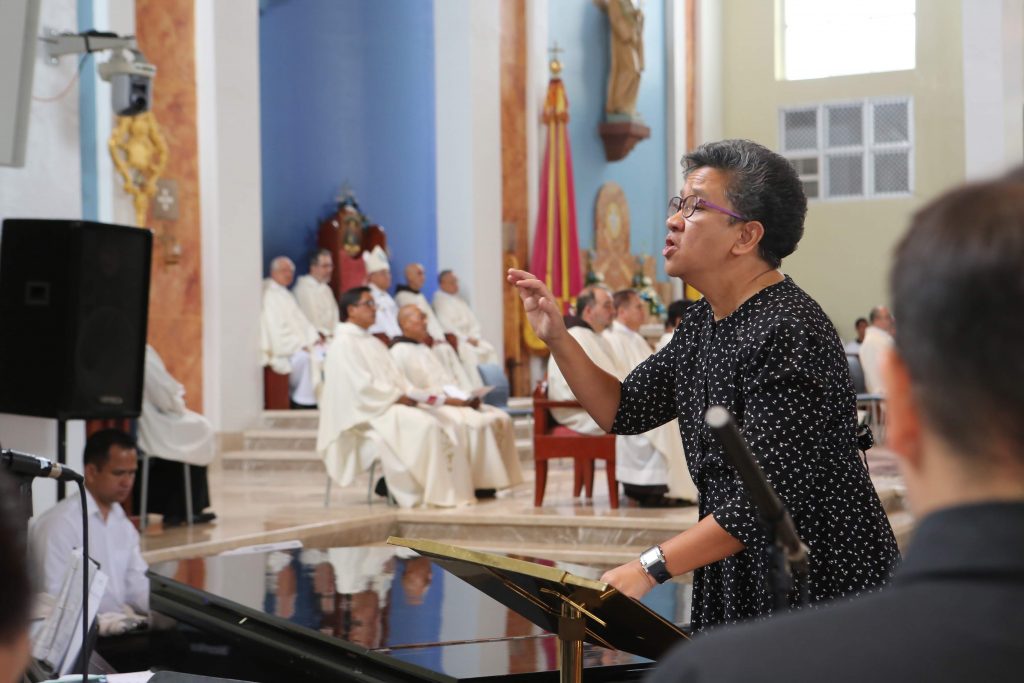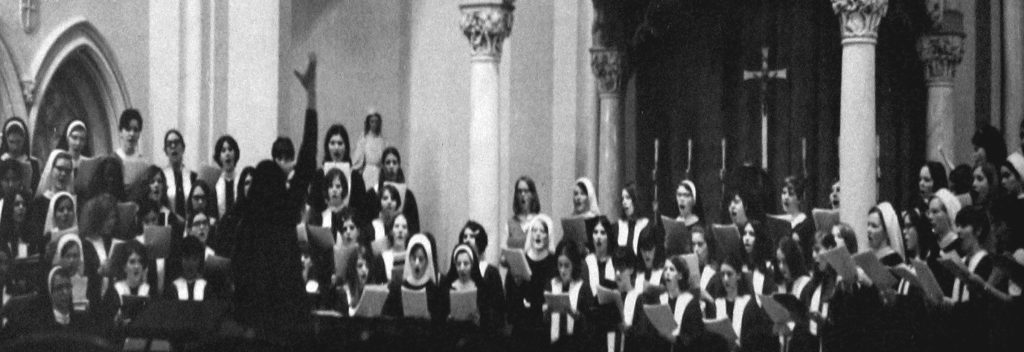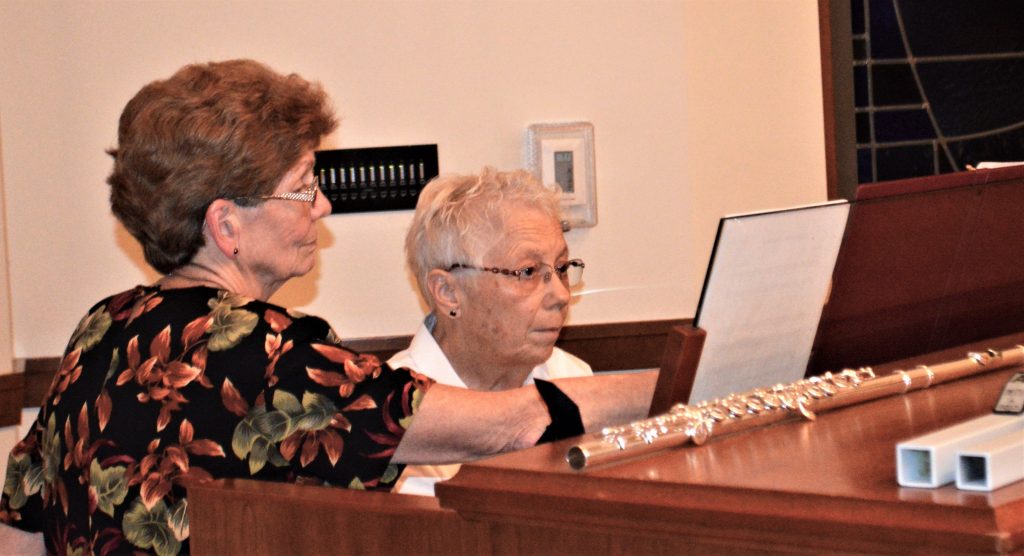By Liz Dossa
“Music has a special way of touching our hearts, of laying open the mystery. Because it is a social art, it enables us to do this together as a community. Music enlarges and expands the message.”
– Sister Suzanne Toolan
Song is deep in the fabric of Mercy life. A Suscipe reverberates through a Mercy congregation gathered for Foundation Day in Chicago. The familiar words “My God, I am yours” are a precious affirmation of commitment. The sisters are intent, as they sing the familiar Mercy prayer set to music.
In California, sisters stand with hands extended, singing a vigorous “Amen” in blessing over new leadership. In Guam, A Te Deum in Chamurro—“Hagu Yu’os, Te Deum”—rises up across a chapel.
For some sisters, composing music is not just a hobby or something they enjoy but an integral part of their vocations that manifests in different ways over lifetimes of service.
Study and Preparation
Over the last 60 years, Sisters Marian Arroyo, Jeannette Goglia, Claudette Schiratti, Cynthia Serjak and Suzanne Toolan have put pen to paper to create melody to match words. Although many sisters have written music for special occasions, often by ear, few have made composing a focus of their ministries. For these few, music is essential to their lives. Their musical journeys began in childhood.
“I’ve been a musician since second grade when I played the piano. I was in the orchestra playing the violin,” says Jeannette, who composed “Circle of Mercy.”
By seventh grade, Suzanne was playing the organ for church in Lansing, Michigan, and earning 25 cents per Mass.

Marian remembers her early years in Guam: “Singing in school and church choirs, having music classes and school concerts and musicals all added to the musicality of my experience growing up.”
Intense training in music and composition followed their early interest. Marian studied music and liturgy at Catholic University in Washington, D.C. Claudette has a bachelor’s and two master’s degrees in music. Suzanne has a music degree from the former Immaculate Heart College in Los Angeles, California, and has taught liturgy.
Religious Life as Creative Opportunity
After these women entered the Sisters of Mercy, being a musician was only a part of their ministries. Following the Mercy charism, they became teachers, choir directors and pastoral workers. Their talent and love of music blossomed into playing, conducting and composing.
One of the biggest difficulties for all composers is finding groups to sing or play their works. New works are risky. In Leipzig, Germany, 300 years ago, Johann Sebastian Bach had a built-in cast of singers to perform for him every Sunday. Without that church choir, how many of his 275 cantatas would have been written?
Like Bach, these sisters led choirs who could be coached and taught new music. Jeannette has had captive performers for most of her life. She was immersed in music in her Merion, Pennsylvania, community, writing melodies for the sisters to sing for the Office. Jeannette taught for 30 years at Merion Mercy Academy, in Pennsylvania, where she founded the music and theater program and was known for her lively inspiration.
Suzanne created a “schola” for the sisters in Burlingame, California, in the late 1950s. Her conducting and her music nourished the special group of novices and Suzanne herself. “I love to compose for a group that I know,” she says. She wrote “I Am the Bread of Life” for an archdiocesan event.

The practical demands of ministry were a gift. “I had a good choir who would sing anything I put in front of them. For a Mercy Day liturgy, it was very tempting, even alluring to think, ‘If I write this piece, it will work because the sisters will pick it up,’” Cynthia says. “I was fortunate to have that environment for 20 years in Pittsburgh.”
Cynthia wrote the often-sung “Amen” for the Mercy Community because “I wanted something longer that what we had. I came up with ‘we celebrate, we bless,’ and sisters have told me they use it in their parishes.”
Also like Bach, each of these composers was driven by deadlines and requests for music for chapters, gatherings, Foundation Day. Suzanne wrote a song for each graduating class at Mercy High in Burlingame for years. These sisters were asked to compose for the Institute founding in 1991.
When legendary Mercy musician Sister Dolores Nieratka asked sister composers to send their music for the CD and book Circle of Mercy in 1992, 40 songs were sent in from all over the world. Jeannette wrote her “Circle of Mercy” in 1993 and was part of its recording for the album. It has been used thousands of times all over the world in Mercy communities to express the deeply felt unity of Mercy.
A professional musician for many years, Sister Claudette Schiratti identifies as a performer more than as a composer. “I spend more time practicing organ and piano than composing but make time for it if requested,” she says. She was invited to compose the opening processional music for the founding event in 1991. “It started with ‘Trocaire’ and ‘Dancing, Singing, Circling’ and then incorporated phrases from the chants Salve Regina and Veni Creator Spiritus for the opening processional music.”
Words, Melody and Prayer
Although a request for a piece may motivate a composer, the process of composing itself is a mystery even for those who practice the art. They find that music and prayer are intertwined. Jeannette has noticed that music comes out of her prayer life. “I take notes on retreats in my prayer book, and music comes out of those words,” she says. “An artist may walk into a forest and see arcs and lines and then add color. Music is like that. First sounds of the words, then varying colors.”
The rhythm and texture of the words suggest the music to her. “Latin is better to write in. It is much more musical,” she says. “English is a very harsh language, hard to get the warmth of prayer.”
On the other hand, the language of the prayer is key for those who are singing it. Suzanne wrote “I Am the Bread of Life” during the 1960s when the liturgy was first being proclaimed and sung in English; the song has now spread all over the world and been translated into 25 languages.

Cynthia emphasizes that, “The music is very tied to the meaning of the words. I take great care to enhance the prayer and not distract from it, even in beautiful phrasing.”
When Marian returned to Guam in 1996, she says, “I discovered the need to have liturgical music written in the language of our native people, so I filled in the gaps, so to speak. After a nonchalant suggestion to write a Mass in Chamorro for the archbishop who was celebrating his 25th anniversary as a priest, I ended up writing the first Chamorro Mass, Misan Santa Marian Kamalen, in honor of Our Lady of Camarin, the patroness of Guam and the Mariana Islands.”
The people in Guam were so grateful to have a piece in their language, she says, that a recording was made.
Publishing Challenges
Is publishing important to these composers? Satisfying a publisher is far different from satisfying a community. Sending material to publishers requires time and effort, as well as the ability to accept rejection. “Most publishers for Catholic music focus on what can be used in parishes and
what is usable as service music,” notes Cynthia. “It is hard to break into that world. It is difficult to get started.”
Bob Batastini, GIA Publications vice president and senior editor emeritus, published “I Am the Bread of Life” in 1966. He remembers that the main reason Suzanne’s work was published was that, “She broke the mold” in the excellence of her music, he says, but also, “We thought her
music, as with much of what we were looking to publish, had a life beyond the strictly Catholic market.”
Though much of the music composed by Sisters of Mercy is loved and sung worldwide in the Mercy Community, it may be most valuable, ultimately, to the Mercy Community itself. Publishing it outside the Mercy market is an uphill battle, especially, as Batastini notes, since publishers are flooded with compositions. “We end up publishing five percent of what we receive,” he says.
Cynthia adds, “Commercial publishing is not necessarily an indication of musical skill—more a matter of luck and time spent.”
Writing the music as prayer brings deep satisfaction to these composers, who give a gift both to those who sing and hear it. Melody gives the prayer wings beyond the words. “It is part of the dance of the universe,” says Cynthia.
Marian writes: “I think the most satisfaction about writing music is the essence of making a contribution to life … contributing to beauty and elegance, the harmony of life, and touching hearts, nerve endings that reach deeply into the soul of humanity where words alone cannot resonate. Even if for a moment we experience those rich expressions and harmonies sung within the context of prayer or at the pinnacle of the liturgical celebration, the satisfaction is beyond words.”
Liz Dossa is a communications manager for the Sisters of Mercy West Midwest. She can be reached at ldossa@mercywmw.org.
Mercy Music Project
Sisters of Mercy who perform or compose music are encouraged to submit sheet music, recordings and performances (in any format); ephemera (programs, flyers, composing notes, etc.); and artifacts (instruments, etc.) to Mercy Archives as part of a larger project to collect, compile and provide context related to original Mercy creative works. The ultimate goal is to create a comprehensive music inventory and make this rich collection available to the wider community. This project will be an important addition to the collection of Mercy-created resources and extend the Mercy Community legacy for the future. Think you may have something to contribute? Not sure? Contact Mercy Archives with questions or for more information: MercyMusic@sistersofmercy.org.